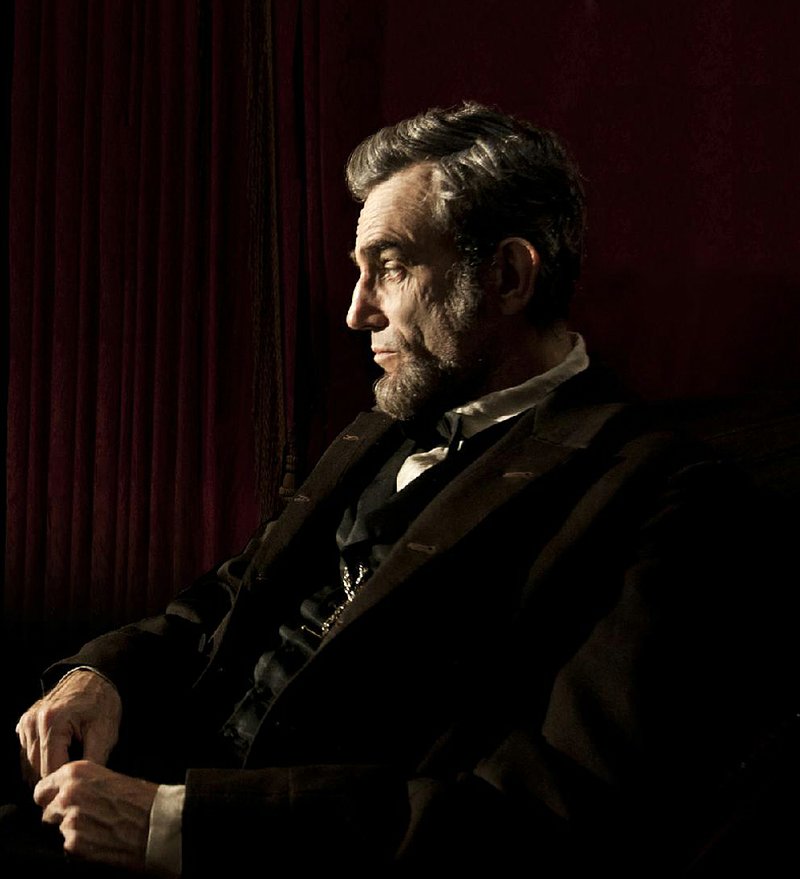LITTLE ROCK — Because the 16th president of the United States has his likeness on pennies, $5 bills, a monument and Mount Rushmore, it’s easy to forget Abraham Lincoln was a real person. Steven Spielberg’s new film Lincoln does nothing to contest Lincoln’s iconic status, but he and screenwriter Tony Kushner (Angels in America and Spielberg’s Munich) skillfully recall how he attained it.
What makes Lincoln more engaging than a historical slide show is that Kushner and Spielberg remind us that Lincoln’s most noteworthy achievements didn’t come easily, particularly during the final months of his life.
While the president (Irish actor Daniel Day-Lewis, who already looks like him) is prepared to start his second term with fellow Republicans in charge of the House and Senate, the party is hardly unified on how to end the Civil War and slavery. In order to bring the Confederacy back into the fold, some of Lincoln’s advisers in the Oval Office and Capitol Hill want him to backtrack on the Emancipation Proclamation, which, on paper, freed slaves in secessionist states.
But the president now wants his abolitionist goals to become concrete. With the lineup of rogues in Washington, that seemingly simple, obviously worthy objective might have been easier to achieve in Richmond, Va., the Confederate capital, instead of D.C.
The remaining Democrats in the House, led by New York’s Fernando Wood (Lee Pace), are energized and raise thorny questions about whether blacks might then be allowed to vote or even marry whites.
Knowing that the president is determined to have the 13th Amendment pass before the South is readmitted to the Union, Secretary of State William Seward (David Strathairn) recruits a trio of lobbyists - W.N. Bilbo (James Spader), Robert Latham (John Hawkes) and Richard Schell (Tim Blake Nelson) - to persuade enough lame duck Democrats to vote for the amendment on their way out of the House.
In addition, getting the GOP to act in concert is a nightmare because House Ways and Means Chairman Thaddeus Stevens (Tommy Lee Jones) is a rigid, cranky fellow whose previous achievements include embarrassing first lady Mary Todd Lincoln (Sally Field) about her lavish, publicly funded furnishings.
Kushner supplies Lincoln with a sense of outrage about how close the 13th Amendment came to failing. The deals and compromises the president and his minions have to effect at times seem as absurd as the ones Jonathan Swift dreamed up in Gulliver’s Travels. The Lincoln who emerges from this story is not an unyielding champion of justice, but a master politician. In the film, you’ll catch “Honest Abe” hedging and even lying, albeit always for the greater good.
At times, Spielberg’s formal direction seems a step behind Kushner’s mental gymnastics. The music seems to swell on cue, but he and Kushner come up with some refreshing touches that make Lincoln worth catching even if you’ve already seen Henry Fonda, Hal Holbrook (who’s in this film) or Sam Waterston play the role (and play it well).
It’s a given Day-Lewis would submerge himself in the role, but instead of cracking the mysteries about Lincoln, he and Kushner capitalize on them. When presented with challenges, the commander in chief breaks into sometimes sidesplitting anecdotes before getting down to business. His true motives appear only in the margins and only to the alert. Day-Lewis’ low-key delivery, which is 180 degrees removed from his work in There Will Be Blood, builds a sense of suspense about what is going on behind the jovial facade.
Field’s first lady is certainly overwhelmed with grief. She’s lost one son and is afraid her other boy, Robert, (Joseph Gordon-Levitt) is too eager to go to war. Nonetheless, Field treats her as depressed but not demented, making some of the previous depictions of her seem almost misogynistic.
It’s doubtful that a Pennsylvanian like Thaddeus Stevens would have had Tommy Lee Jones’ Texas drawl, but it’s hard to think of another performer who can nail Stevens’ resolve and irascibility. Jones also gets points for coming off as intimidating even though he’s wearing an intentionally foolish-looking wig.
Even some die-hard Confederates had a soft spot for Lincoln. Silent movie pioneer D.W. Griffith depicted him nobly in his KKK-loving The Birth of a Nation. He even made his first sound film in honor of the president. Because there’s such a lasting fascination with Lincoln and his legacy, Spielberg may be playing it safe with making a movie about him. On the other hand, retelling the Lincoln story for the nth time holds its own risks, but it’s a gamble Spielberg easily wins.
Lincoln 90 Cast: Daniel Day-Lewis, Sally Field, David Strathairn, Joseph Gordon-Levitt, James Spader, Hal Holbrook, Tommy Lee Jones, John Hawkes, Jackie Earle Haley, Bruce McGill, Tim Blake Nelson, Joseph Cross, Jared Harris, Lee Pace Director: Steven Spielberg Rating: PG-13, for an intense scene of war violence, some images of carnage and brief strong language Running Time: 120 Minutes
MovieStyle, Pages 33 on 11/16/2012
